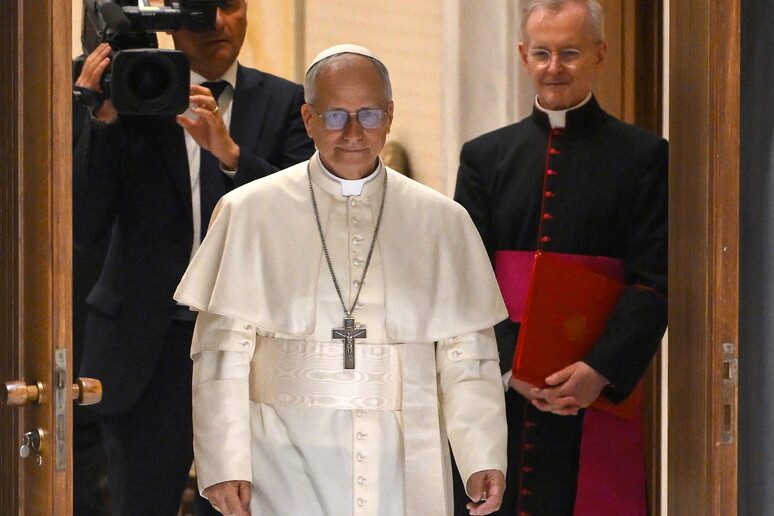Pope Leo XIV said it is necessary to
disarm our words to disarm the world on Monday as he started his
first full week as the head of the Catholic Church with an
audience with media professionals in the Vatican's Paul VI Hall.
"Let us disarm words and we will contribute to disarming the
Earth," said the American pontiff, who was elected Pope
Francis's successor at last week's conclave.
"Disarmed and disarming communication allows us to share a
different view of the world and to act in a manner consistent
with our human dignity.
"You are on the front line in narrating conflicts and hopes for
peace, situations of injustice and poverty, and the silent work
of so many for a better world.
"That is why I ask you to consciously and courageously choose
the path of communicating peace".
Quoting Jesus' Sermon on the Mount, he invited reporters to be
peacemakers and "to carry out a different kind of communication,
one that does not seek consensus at all costs, does not clothe
itself with aggressive words, does not espouse the model of
competition, never separates the search for truth from the love
with which we humbly must seek it.
"Peace begins with each one of us: with the way we look at
others, listen to others, speak about others; and, in this
sense, the way we communicate is of fundamental importance," he
continued, telling journalists to say no to "the war of words
and images".
"We must reject the paradigm of war," he said.
Leo XIV also said that, in the face of the "immense potential"
of artificial intelligence, it is necessary to have
"responsibility and discernment to orient the instruments to the
good of all, so that they may produce benefits for humanity.
"This responsibility concerns everyone, in proportion to their
age and role in society," he said.
The new leader of the Catholic Church also identified AI as one
of the biggest issues facing humanity during his first outing as
pope on Saturday, a visit to a sanctuary dedicated to the
Madonna run by his Augustinian order at Genazzano, to the south
of Rome.
Ukrainian President Volodymyr Zelensky, meanwhile, said on
Telegram on Monday that he has spoken to Pope Leo XVI on the
telephone for the first time and invited him to Ukraine during
the call.
The pope made an impassioned appeal for the end to conflict in
the world's war zones, in particular Ukraine and Gaza, echoing
many such appeals made by Francis, during his first Regina Coeli
address from the central balcony of Saint Peter's Basilica on
Sunday.
On Monday the pope also indicated he would fulfill a commitment
made by Francis to visit ancient Nicaea, now the modern-day
Turkish town of Iznik, to celebrate the 1,700th anniversary of
the First Council of Nicaea.
When asked about this by reporters, he said that "we are
preparing it".
Among other things, if the visit goes ahead, it will be an
opportunity for the new head of the Catholic Church to meet
Patriarch Bartholomew, the leader of the Eastern Orthodox
Church.
The First Council of Nicaea is recognized as a landmark event by
all Christian denominations and its achievements include
settling the issue of the divine nature of God the Son.
ALL RIGHTS RESERVED © Copyright ANSA











